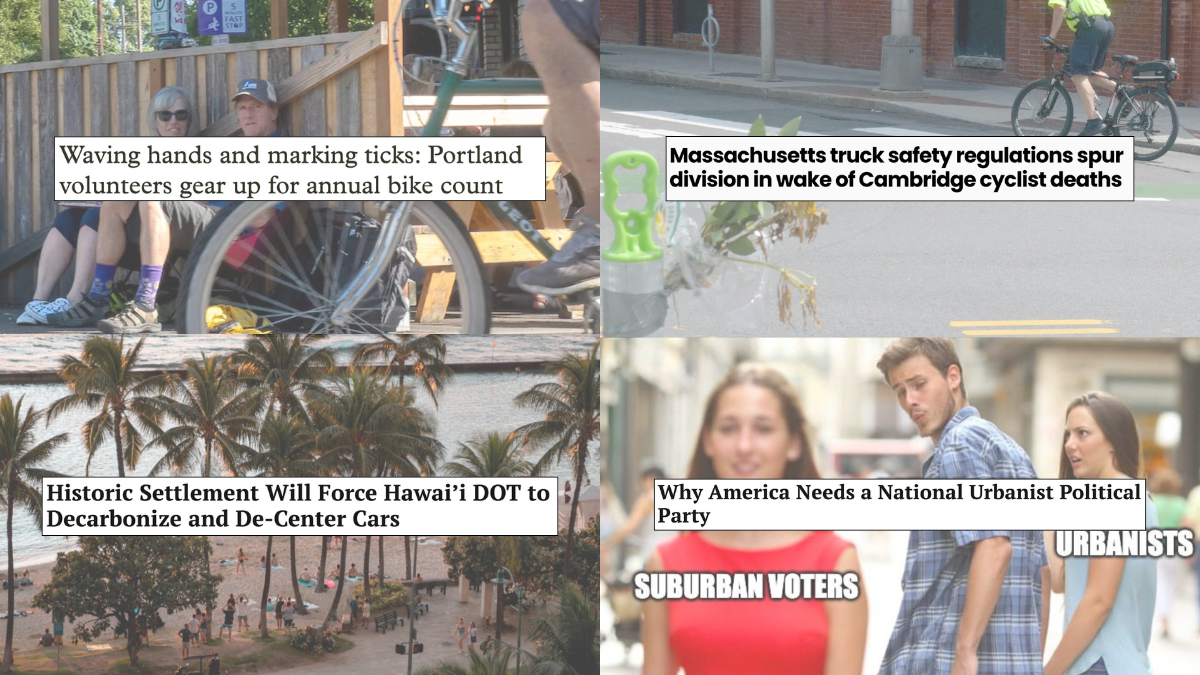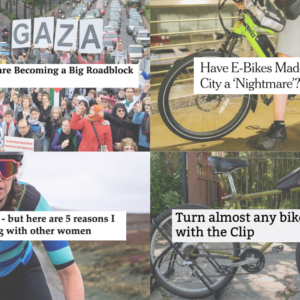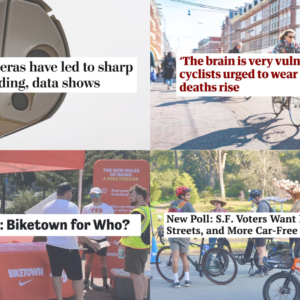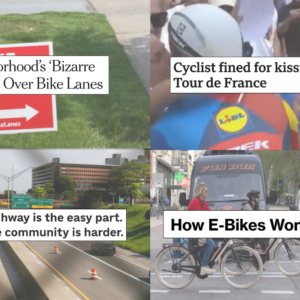Welcome to the week.
Today’s Monday Roundup is sponsored by the City of Portland 2024 election team who will be our special guest at Bike Happy Hour this week. Come out and join our mock election where we rank bike projects to learn how the new ranked choice voting system will work.
And with that, here are the most notable items we came across in the past seven days…
Expired registrations reality: Turns out that the estimated number of people driving cars with expired tags might be far lower than the City of Portland said it was when they sought to drum up political support for more enforcement officers. (OPB)
E-cargo bike share: Imagine bike share like Biketown, except the bikes are electric cargo bikes you could use to haul kids or cargo or both?! Learn more about CargoB in Boston. (Streetfilms)
Listen up: New research found that the use of headphones while cycling did not have significant cognitive impacts. (Transportation Research)
Olympic urbanism: Athletes and sport won’t be the only thing on grand display at the Summer Olympics later this month as Paris plans to use the global spotlight to highlight its commitment to bicycle urbanism. (Momentum Mag)
Central city progress: PBOT’s Central City in Motion plan was adopted in 2018 and the city is half way through the list of projects. (OPB)
Deadly hoods: Science now confirms that cars, trucks, and SUVs with squared-off front hoods come with a significantly higher risk of killing someone as a result of a collision. (Journal of Safety Research)
Bike counters, assemble! It’s that time of year when volunteers with clipboards closely watch traffic and record the number of bicycle riders on hand-written forms that become part of the city’s official database. (OPB)
Climate obligation and cars: Victory in a lawsuit brought by Hawai’i teenagers will force that state’s DOT to a list of reforms that will require them to “decenter cars” in transportation planning. (Streetsblog USA)
Truck lobby opposes safety regulation: In wake of cyclist deaths that involved large trucks, a lobby group is pushing back against new safety equipment requirements that advocates say will save lives. (Boston Herald)
National urbanist platform: Author and great cities advocate Diana Lind thinks it’s time for a national political party formed around urbanism — or at least a powerful urbanist PAC to raise money for candidates that understand the importance of smart city policies. (Streetsblog USA)
Thanks to everyone who sent in links this week. The Monday Roundup is a community effort, so please feel free to send us any great stories you come across.








Thanks for reading.
BikePortland has served this community with independent community journalism since 2005. We rely on subscriptions from readers like you to survive. Your financial support is vital in keeping this valuable resource alive and well.
Please subscribe today to strengthen and expand our work.
The Hawaii story is inspiring. It’s easy (for me) to be pessimistic that government action will happen at all on climate change, but this is an interesting path. Literally bringing lawsuits against departments of transportation. I haven’t looked into the specific case and claims (and am not a lawyer) but it definitely seems like a good argument that youth have standing more than anyone else in a case like that. I wonder if / wish we could get a lawsuit against ODOT related to the freeway widening madness. They have no business making highways bigger and it’s just baffling to me. But how to have an impact on any of it, I have no idea.
No More Freeways is part of a coalition that has current and past lawsuits against ODOT. And, they’ve been big supporters of the Sunrise PDX movements protesting ODOT. So, maybe throw a few bucks their way to support this excellent idea.
Perhaps instead of supporting incrementalist orgs that are strongly affiliated with democratic party, we should instead support the radical anti-capitalist politics needed to transform our ecocidal economic system.
How many decades of voting for progressive democrats will it take for the “climate movement” to realize that it could be part of the problem?
How would supporting radical anti-capitalist politics actually change anything? Do you think that NoMoFreeways and Sunrise would get more traction if they were completely excluded from the conversation? Does radical anti-capitalism even reflect the values of the people in those orgs?
There’s definitely a danger of co-option (The Street Trust is a great example of this), but if you’re too easily dismissed as a bunch of far-out freaks, you won’t be in the room when the decisions are made. Radical is good, but too radical is worse than not radical at all.
Assuming, of course, that the goal is maximizing potential gain rather than posturing. I’m hoping for maximum gain for both of those orgs.
Speaking of “posturing”:
OR 2012 energy usage: 45% fossil fuels
OR 2021 energy mix: 46% fossil fuels
The “in the room” soft denialism that you valorize will seem like a far-out moral failure in coming decades. And it seems to me that it is climate scientists who have become the “freaks” that the “movement” ignores because science-based mitigation pathways no longer fit the narrow window of first world “progressive” politics.
I’m not sure I understand the…
Well, that’s not quite true actually, I don’t understand what you mean by the term. I sense you are agreeing with Watt’s statement of…..
I’m just not sure how you see how progressive politics ignores science (if I’m understanding correctly).
The reason I’m asking is I’m curious if you think that progressive politics ignore science the same way in which conservatives ignore science which has got us where we are now, holding a melted ice cream cone and wondering if that was the last ice cream we almost had time to eat.
You don’t understand what I meant but you still claim that it’s not true?
First of all, my comment focused on “climate science”, not
“science”. Secondly, my comment was referring to the UN IPCC consensus and the mitigation pathways described in these reports. The lack of tangible progress in achieving these aims is met with more insipid incrementalism from “progressives”. Where is the progress that progressives claim is their ethos? Where are the policy proposals and legislation that would result in cuts in emissions consistent with IPCC models?
PS: Because progressivism in the USA relies on grand coalitions of competing interests (many of whom do not care much about ecocide) proposals to address the climate crisis have been repeatedly watered down to the point of being too little and too late.
It has nothing to do with what I “valorize”; it’s a question of whether you have a voice, or you’d rather leave it to others.
I notice that absent from your posts is a roadmap for how going full anti-capitalist radical will move things forward at all more quickly than the current approach.
So I issue the same challenge to you as I do to everyone else: tell me how your way can work.
WTLBCTOTL won’t have a good answer here, if any answer at all. Self-righteous rage and moral superiority is the goal. It’s exhausting.
The roadmap is clearly outlined in UN IPCC consensus reports and involves a mixture of MANDATES and REGULATION that lead to science-based mitigations/adaptations. What’s completely missing is the political will to implement these transformative changes (1-3% of GDP per annum) and put human well-being above the interests of multinational corporations.
This is the part Watts wants you to explain. What is your path for developing the political will to implement MANDATES and REGULATION?
This is such a status quo-oriented question. When the Overton window ranges from right-wing authoritarianism to right-wing corporatism a more radical approach is inconceivable.
The back and forth between Monbiot and Malm is a good example of how “progressives” can’t fathom how an approach beyond pointless incremental reform and/or oh-so-polite civil disobedience is worthwhile:
https://www.versobooks.com/blogs/news/in-defense-of-sabotage-a-response-to-george-monbiot
I have literally asked you what the path is to change the political status-quo to implement IPCC recommendations. Is your contention that we should just do nothing and hope the political will just develops on its own? That we should bomb the CEI hub and hope that that causes politicians to implement the IPCC recommendations? People are asking you what the strategy is and your response is to flippantly tell them that the mere action of asking what the strategy is shows that they are incapable of enacting it – whatever it is. Developing political will requires developing political power – what is your path for building and wielding that power?
It’s also flippant to not even bother to read a link that outlines why I think the tactics that Malm advocates for are urgently needed and necessary.
At this point people on the right are experiencing profound denial and people on the center-right/center (“progressives”) are experiencing profound cognitive dissonance and apathy but we are rapidly running out of time to mitigate some of the most extreme outcomes. In this context, I support the full diversity of tactics that attempt to shock people out of their unwillingness to address this ongoing ecocide. These tactics range from more mainstream approaches (e.g. protest theater, absurdism, bird-dogging, sit-ins, occupations/autonomous zones) to a whole range of illegal tactics that I won’t list because this “progressive” site tend to moderate advocacy of illegal actions (but you can read Malm’s essays and books if you are genuinely interested). In particular, I think these illegal tactics are the only hope for shocking the somnolescent public out of denial/dissonance.
Great; I’m in. I agree we are lacking political will, but you’ve failed to answer the fundamental question about how being a radical anti-capitalist (i.e. wanting the state to direct economic activity) will help get the necessary regulations implemented. It is hard to implement new laws if you set yourself in opposition to the system needed to implement them.
(I would also point out that most of the (insufficient) progress we have made is the result of capitalists acting in their own self-interest, building EVs, building ever more efficient solar panels and wind turbines, etc. We can argue the extent that “capitalism” is to blame for our current burden of CO2 (socialist countries seemed just has happy to burn huge quantities of coal as capitalist ones), but it seems inarguable that capitalism will be the key force to getting the things we agree need to happen done. Wanting to sue Exxon out of existence (for example) is not inherently anti-capitalist. Declaring no one can make a profit installing solar panels or inventing more efficient energy storage might be. “Capitalism” does not mean without regulation or social programs — Scandinavian countries are highly capitalist, and have plenty of both.)
An incremental approach that is compatible with corporate profits will not avoid horrific outcomes (e.g. ~2 C of warming). Capitalism not only created this crisis but it’s focus on profit and wealth hoarding makes it inherently incapable of funding the transformative changes needed. An awful lot of that hoarded wealth needs to be spent (or inflated away) and much of that future profit needs to be appropriated by the state to begin to address the magnitude of tragedy of the commons that capitalist greed and rent-seeking created (and is continuing to worsen).
You can support more than one organization. NMF is also hardly “affiliated with the Democratic Party”, they have a pretty clear narrow political goal, and are actively suing the administration of a democratic governor
One of the founders of NMF is a long-term democratic party operative/staffer and both they and another founder practically begged people to vote for this very same democratic governor. This “theater” of pretending to be opposed to the democratic party’s climate arson while on the other hand overtly supporting the democratic party is exactly what I was commenting on above.
In my opinion, neither the democratic party nor the republican party are interested or, even, capable of beginning to address the climate crisis.
The truck lobby’s opposition to the safety equipment is illogical. Specifically trailer skirts improve fuel efficiency and will pay for themselves. Not to mention reducing crashes will obviously save them money as well as keep their employees happier. I suspect most professional drivers don’t want to kill people while doing their jobs and when it happens it’s probably rather devastating and possibly career ending.
The truck lobby in many places, definitely in Oregon, appears to be the tail wagging the dog. Lobbyists fight for things that are not truly in the interests of the industry, but keep the dollars coming to the lobbyists for the appearance of “doing something.”
Trucking wants wider roads and, larger radius corners. Both of which result in their third desire, higher speed limits. Wider roads are pedestrian nightmares and larger radius corners are re higher speed corners. ODOT gives trucking everything they want, justifying their inherently unsafe requests in the name of economic development. Meanwhile the campaign coffers of politicians regularly swell from the largesse of trucking lobbyists. Money talks
Meant higher speeds, not speed limits
Do the corrected numbers for unregistered vehicles affect PBOTs budget projections?
Rigorous enforcement of vehicle registration is great. Unregistered, uninsured and unlicensed cars/drivers should be off the road period.
But did they just hire a bunch of people thinking they were going to recoup payroll many times over but in fact are in a worse financial place even with increased enforcement?
very good questions Steve C. Very good questions. I’m curious about this too and will try to look into it.
Any expired state plate counts, not just Oregon. In our part of Richmond neighborhood, there are a whole lot of expired Washington plates. Some on vehicles serving as homes, but many on vehicles in daily use. On a recent 2 mile walk, we counted about 1 in 6 plates expired (both states); a lot of single-plate vehicles, and at least one per block parked “wrong-way.”
2 PBOT vehicles (one, oddly, an unmarked black truck) cruised all over a SW neighorhood and ticketed at least 12 cars last week, mostly for ‘wrong-way parking.’ No idea if those fines even cover the wages of the pair of employees. And after this burst of revenue, what?
We continue to enforce parking rules? What are you advocating for here? Parking enforcement is worthwhile whether or not the ticket revenue recoups the cost. The goal is compliance, and in turn, safer streets. One could argue that it is fundamentally unhealthy to justify the existence of a law/code enforcement agency by whether or not it breaks even, as this could create undesirable incentives.
I hope they keep driving up and down every mile of street in this city, and enforcing basic regulations. I’ve long been amazed at how lax parking regs and enforcement are in this city. Post-COVID it’s gotten to a breaking point, and I hope this starts to reign things in. Every day that I walk, bike, or drive, I see vehicles that are inoperable, have been parked in the same spot for months, are blocking intersection visibility, blocking curb ramps, blocking the sidewalk, etc.,etc., etc….
My point was that they get a burst of revenue from suddenly enforcing things, and then a trickle as they continue. They will still be broke.
As far as continued enforcement, I would love to see them ticket for parking large vehicles too close to corners and other things. I consider parking the wrong way to be an insignicant issue – there are streets in SE where there is only one travel lane and one parking lane; go around a block to snag a spot the ‘right’ way and it may no longer be there – and the time to spot the crime and write the ticket is better soent making the street safer by focusing on other infractions.
Of course, the REAL safety improvement is to get rid of the idiotic rule allowing parking right to a stop sign or corner. Only town I’ve ever lived in that allows it. Spend all the time they want enforcing that; I’ll help!
My issue with wrong way parking, besides it being goddamn lazy, is that if a driver is pulling into traffic and there is a larger vehicle in front of them, they simply cannot and will not see me as they attempt to enter traffic. They’re on the curbside of the car and basically blind until they’ve cleared the larger vehicle. Admittedly this isn’t happening all the time but it has absolutely happened to me. It’s not safe and it’s all because they couldn’t be bothered to park correctly.
Re: Taller/squared off hoods are deadlier (and water is wet), it is interesting to see this research coming out now, as it is the necessary first steps towards implementing change. Now that it’s been documented, _maybe_ auto/truck/SUV-makers will have to change their ways.
“ Practical Applications: Automakers can make vehicles more pedestrian friendly by designing vehicle front ends that are lower and more sloped. The National Highway Traffic Safety Administration (NHTSA) can consider evaluations that account for the growing hood heights and blunt front ends of the vehicle fleet in the New Car Assessment Program or regulation.”
As long as the car is moving over 45 mph, it will likely kill or at least maim the pedestrian no matter how the front end is designed. Such studies are beyond silly as they help manufacturers avoid liability for designing the vehicles to go too fast, or rather encourage end users to go as fast as possible and to accelerate as much as possible. Which do you prefer, to die instantly or to have both your legs sliced off?
This reminds me of the train engines used by Amtrak versus the freight companies, and even more so by fast European trains (TGV, ICE, etc) with “sleek” aerodynamic fronts the reduce drag. They also, coincidentally, slice up humans in half more efficiently, those who happen to be walking on the tracks, not necessarily suicidal but not exactly playing it safe either – a Cascades train moving at 79 mph takes at least a half mile to stop – and I’ve been on two different Seattle to Portland trains that hit people (and one in NC), with the lower body at one point (usually near a bridge) and the other half about a half-mile away on the front of the engine – a 45-minute delay then ensues in which the police and an ambulance is called, for an “investigation” and to collect the body parts. As a train passenger, you know what the physical impact of hitting a person is? None whatsoever. However, I was once on a Coast Starlight train that hit the back end of a semi truck loaded with chemicals that was illegally crossing a gated level crossing near Salem – we did in fact feel it – fortunately the driver was able to walk away from the crash unhurt (and presumably arrested.) Both of our Amtrak engines burned out their brakes trying to stop too soon and had to be towed by a UP engine into Portland 9 hours later.
What are you talking about? Cars kill people really well at most all speeds, and a majority of those pedestrian fatalities happen at lower speeds, in places where there are lots of pedestrians. Thus, designing vehicles to be more pedestrian friendly can make them safer. Yes, at high speed, some vehicle lower-speed safety features are moot, but that doesn’t mean they shouldn’t be built into a car. I’d rather be alive in a wheelchair, instead of dead under a brodozer.
Trains? Cool story, but mostly irrelevant to auto/ped safety design.
“Deaths from motor vehicle crashes with pedestrians have increased 83% since reaching their low point in 2009 and account for 18% of crash fatalities.
Pedestrian deaths occur primarily in urban areas.
Because traffic speeds affect the risk and severity of pedestrian crashes, reducing speeds can lower pedestrian deaths.
Vehicle factors also are important. Serious head, pelvis and leg injuries are common, and the severity of such injuries may be mitigated through improved vehicle design”
Pedestrians (iihs.org)
I’d choose losing my legs, but how silly. What about the third option–not getting hit at all, because the driver can see you because their hood isn’t blocking their visibility?
Why?
A cargo bike share here would be so cool. Like most of the time I don’t need to haul big/heavy things, but when I do it’d be great to have that option as an alternative to “ok this won’t fit in my bags so I guess I’m driving”.
So the headphones thing: The study appears to consider only _simulated and routine_ tasks like passing someone walking, not the crucial real-world hearing function of getting advance notice of something sketch shaping up behind you. Not quite worthless, but almost.
Or hearing cross-traffic before you see it. That’s the main way I stay safe by using my hearing.
It’s like that old train crossing sign of “Stop, Look, and Listen”. Sight and hearing are equally important, even if you’re rolling an intersection. I don’t get riding with headphones at all.
This is a great example of one of those studies that isn’t really needed. We all know from experience that sound is extremely important when riding in an urban environment. Some riders choose to blast music and take extra risk, and that’s fine for them. But studies like this can be dangerous, as new riders might draw incorrect conclusions.